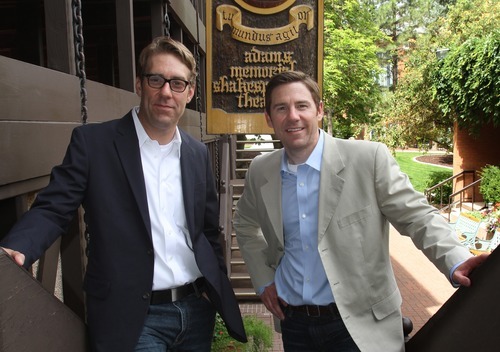This is an archived article that was published on sltrib.com in 2011, and information in the article may be outdated. It is provided only for personal research purposes and may not be reprinted.
The Utah Shakespeare Festival celebrates its 50th anniversary this season, yet remains in the shadow of its older, bigger sister in Ashland, Ore. On a walk through the California redwoods in July, I ran into a family from Orem who were on their way to the Oregon Shakespeare Festival. When I told them I had just reviewed the Shakespeare productions in Cedar City, the mother confessed, somewhat shamefaced, that she had never been to the Utah Shakespeare Festival.
—
A trio of new leaders • A rare opportunity this summer to see Utah and Oregon productions back-to-back offered insights into where the two festivals seem to be headed.
Interestingly, both festivals recently appointed enthusiastic, energetic artistic directors. Bill Rauch succeeded Libby Appel at Oregon in 2008, while David Ivers and Brian Vaughn, longtime popular actors at the Cedar City company, officially took the helm at the Utah festival this season. It's too early to assess Ivers and Vaughn's impact, but they already have announced an initiative to produce the entire Shakespeare canon in chronological order over the next 10 to 12 years.
Five years in, Rauch's aims are more apparent. He's increasing Oregon's dedication to multicultural productions and cross-gender casting; now 40 percent of the acting company are people of color.
Most exciting are the productions in the New Theatre: a fascinating version of "Julius Caesar" with Caesar as a woman; and a knockout production of Jonathan Moscone and Tony Taccone's "Ghost Light, a fluid and emotionally powerful study of the way Moscone dealt with — or in many ways, didn't deal with — the assassination of his father, San Francisco Mayor George Moscone. "Ghost Light" is the second in an ambitious new-play series Oregon is commissioning called American Revolutions.
—
Updating Shakespeare? • Oregon's approach to staging Shakespeare appears more problematic. Critic colleagues there suggest that the prevailing attitude is that it's up to each generation to reinvent Shakespeare.
Since it's impossible to determine exactly what Shakespeare intended — other than entertaining a wide range of audience members, that is — the Bard's canon is open to reinterpretation. As a theater critic, my question is: How far can you go without compromising a play's integrity and obscuring its themes?
Oregon's production of "Measure for Measure" offers one example in the way it takes far too many liberties with Shakespeare. Rauch, who directed the production, has set it in a Latino community, which works, with mariachi singers, which doesn't.
One Oregon critic commented that Rauch has 300 imaginative production ideas, but someone should tell him to select just the most coherent ones. Those mariachi singers pop up so incessantly it's hard to determine what the play is really about. "Measure for Measure" may be a "problem play," but this isn't the problem Shakespeare had in mind.
—
The concept of stage "concepts" • If you assume these contemporary concepts are all in the service of making Shakespeare "more relevant," the critic in me suggests the Bard doesn't need help.
His plays have survived for more than 400 years precisely because they are relevant, and a play like "Measure for Measure" about political and moral corruption and sexual impropriety is especially timely. Messing with it too much — imposing elaborate concepts — only makes the work muddy.
Utah seems to understand this. The festival's goal is making Shakespeare accessible, intelligible and entertaining for all ages. Productions in the outdoor Adams Shakespeare Theatre remain traditional and language-driven. Productions in the Randall Theatre offer more opportunity for innovation, but faithfulness to the text is still central. Feedback at the festival's popular literary seminars seems to indicate that audiences, even young ones, are happy with that approach.
—
By what measure? • But I suppose it's hard to argue with success, and Oregon's audiences seem to welcome the innovations. And a recent Utah foray into revisionist territory — a 2008 production of "The Taming of the Shrew" that cut a third of the text, rearranged scenes, set the play in post-World War II Italy and threw in "That's Amore" as the finale — was one of the hits of that season.
Still it's hard for me to believe that any writer, even a dead one, would be happy with so much tampering with his text. I applaud the Utah Shakespeare Festival's dedication to helping Shakespeare be accepted on his terms. As the festival enters its second half-century, it's time for Utahns to acknowledge USF's excellence and move it out of the shadow into the light.
facebook.com/tribremix —
At a glance: Oregon and Utah Shakespeare festivals
OSF • 76 years old; founded in 1961
Season • Runs 8 ½ months, 780 shows
Annual budget • $29 million
Attendance • Draws 415,000 for 11 shows
Capacity • 2,150 in three theaters
USF • 50 years old; founded in 1935
Season • Four months, 300 shows
Annual budget • $6.5 million
Attendance • Draws 130,000 for eight shows
Capacity • 1,664 in two theaters



